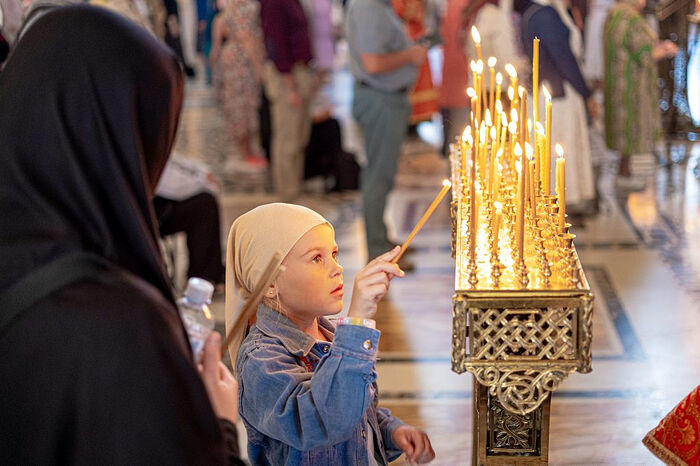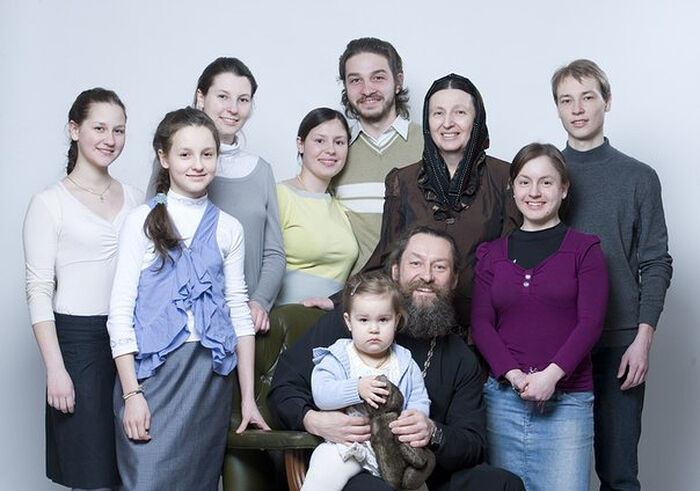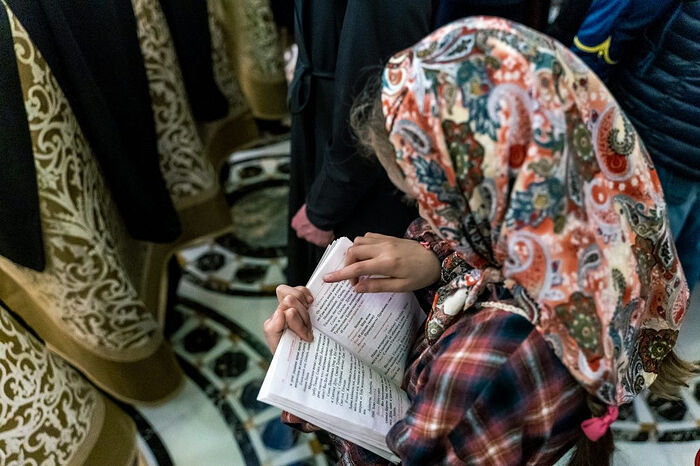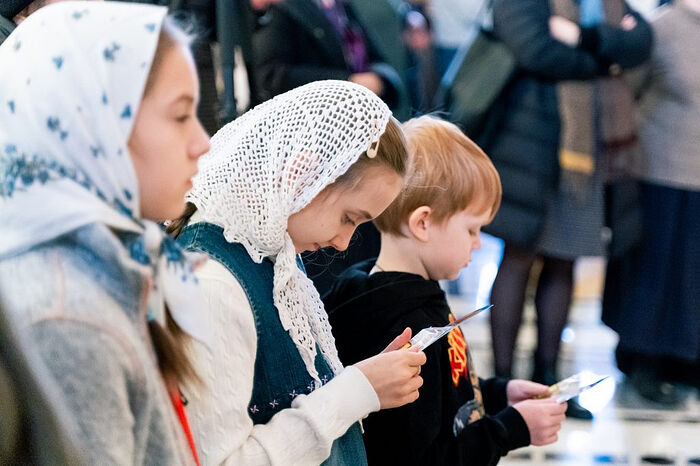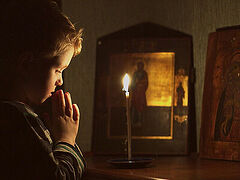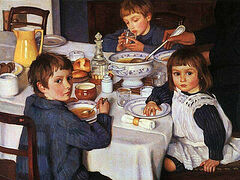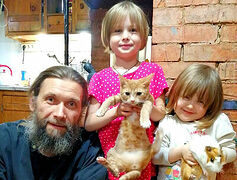One of the subjects discussed as part of the”Let’s Talk” project of the Moscow Sretensky Monastery’s Spiritual and Educational Center was the upbringing of children. Even if a child is raised in a Christian family, parents will not be able to completely protect him from the cruelty of this world, from evil and injustice. How to overcome the laws of this world, how to teach a child the true Christian virtues so that he can live by them his entire life? Archpriest Andrei Yurevich, the rector of the Church under construction of the Archangel Michael in Kurkino (in the north-west of Moscow), and his wife Olga, parents of seven children, have shared their experience.
 Fr. Andrei and Olga Yurevich. Photo by Arseny Yurevich
Fr. Andrei and Olga Yurevich. Photo by Arseny Yurevich
The main purpose of raising children is their meeting with Christ
Archpriest Andrei Yurevich:
Some character traits, such as those related to discipline and order, are important to believers and non-believers alike. We cultivated and instilled them in our children unceasingly. And as a priest I will not employ someone to work at my parish if he does not understand what discipline, obedience, and order mean.
Or, for example, a quality such as responsibility. In Siberia, where I was the organizer and principal of an Orthodox high school for fifteen years, I worked with students. There was a special subject—life sciences. I would tell youths: “You are men. Do you understand that one of the primary qualities for a man is to be responsible? An irresponsible man is a real disaster in everything, whether it be work or family.” I believe that today more than half of the problems of all families come from this. And these qualities can be instilled without faith—although they exist in faith as well, and one can even find them in the Holy Scriptures. For example, when the Lord created the world, everything was in order. This order was established by God from the time of Creation. There is harmony in order.
When it comes to responsibility, Adam was originally entrusted with: the garden that was planted, all the animals and plants that were there, and the wife that the Lord made from Adam’s rib and gave to him. But Adam failed to cope with this responsibility—perhaps that is why irresponsibility spread throughout the world after that. Of course, there are qualities that can be instilled only by faith. The seed of the Logos was poured out all over the world. Christian virtues were poured out into the human world, even if people have no conscious faith. For example, mercy is inherent in any person. Kindness is a Christian quality. God has given love to everyone’s heart. Interpreted through faith, all this becomes a little different.
Olga Yurevich:
I realize that there is a strong contradiction between the world and faith. There is good news—family always comes first in raising children in terms of influence. What happens in the family will above all influence the child. For religious parents this gives a feeling of great comfort. How to resist the world? Christ said, I have overcome the world (Jn. 16:33). The most important goal for Fr. Andrei and me in raising children and their development is their meeting with Christ. If they meet Christ, we can be assured, because Christ overcame the world, and it is impossible for us to overcome the world without Christ.
It is very important to set yourself this goal. Once as I was being taken by car to a meeting, the driver asked me to advise him how to make sure that his son would not leave the Church. I replied, “You are asking the wrong question. You should have asked how to help your son meet Christ. If he meets Christ, then completely different questions will arise.”
It is the easiest with young children. If you for instance are a traveller, your children will be fond of travelling. If you enjoy going to museums, your little ones will enjoy it as well. If you are believers, your children will go to church with you. All this is natural for them. If parents are in church, they feel at home there. And when children grow up, their parents have more complex tasks. Children begin to analyze, rebel, ask awkward questions, etc. They notice that their parents say one thing but do another.
A child meeting with God occurs through his parents’ meeting with Him. The life of a child is a result of this meeting. And children grow up in the grace of this meeting.
Protest in adolescence
Olga Yurevich:
Even if a child is raised in a religious family, he sometimes begins to do the opposite of what grown-ups do: his parents go to church and pray, but he refuses. What can be done?
This is absolutely natural when an adolescent begins to build his personality. At the same time, he builds it from scratch and needs to clear the territory. And everything around seems alien to him. Our goal is to ensure that each of them has a personal meeting with Christ before they start throwing stones. Then they will sweep away everything, challenge everything and argue with everything in the world, but not with faith. This will be their faith, and not that of their parents, of their father-confessor or friends. They don’t reject what they love and appreciate. It seems to me that this is why our children went through this period almost without trouble.
You can start talking about faith with your children at the age when they begin to take a keen interest in various things. We told our children: “It’s good that you go to church, pray, study at an Orthodox school and have such nice friends. But the most important thing is missing—a personal meeting with Christ. It will be when you grow up and can stand before Him face-to-face. And Christ will ask you how you are going to live. This choice will be yours.”
And they start thinking about it. Unless we tell children about it, they will not think about it. Their parents and priest praise them, they come to church for confession, and everything is fine. But then teenage years come, and something must lie ahead of them. They think about it, waiting for the moment when they grow up and the Lord calls them to a personal meeting. They prayed about it, and we as their parents prayed for them. Our younger children asked the older ones about it. For example, I heard the following question: “Asya, have you already met Christ? And what was it like?” When there are many children, they have such conversations. Naturally, when this meeting takes place, it is the Lord’s knock at the door. It does not depend on us. It can happen with some at nine years old and with others at thirteen. When this meeting takes place, it always appears to be a long-awaited one. After that it is possible to go through this difficult period more easily.
Archpriest Andrei Yurevich:
Once I was the rector of the only parish in Lesosibirsk [a city in the Krasnoyarsk territory in Siberia.—Trans.] where we lived, and served there for twenty years. My main task was to create living conditions based on my children’s needs. Our children were growing up, and I understood that first of all they needed an environment, as did our parish children. We tried to create it. We had a children’s room, a kindergarten in the church, then junior classes of the school appeared, along with our children’s camp with summer rafting, a museum, and a youth club. There were over 100 children, and it was important for them not to be isolated. Our own children lived in this environment almost from birth. It also brought them up, and not only our family. In such an environment it was impossible not to go to church and classes.
But when our son refused to go to the high school, we agreed with the principal of the cadet corps, and our son joined them. In the end, he stayed there only for one semester. He would write letters to us from there, come on weekends and try to tell us something with tears, but we pretended not to hear anything. He would again go away for a week and live there. Eventually we realized that the boy had to be rescued, and we took him from there. For the remaining four years, we never heard any negative words from him about the school. I don’t want to say anything bad about the cadet corps, but their child raising techniques were different from ours. In our family there were slightly different crises, more personal in nature, while the system and the environment were comfortable for the children.
There is a term—children of religious parents. To some extent, this is a diagnosis. It is good if a person comes to believe in God in adulthood. And what if he was born, like the apostle Paul, a Roman citizen? He was born into a religious family. And a lot of people don’t care about faith. The Church cannot keep a person only through its customs, traditions and way of life, without an inner experience. And in order for him to survive this he should live with the awareness that something must happen, something awaits him. He must experience a “meeting” and “fall in love”.
Any teenager understands that you need to meet a special person, fall in love and get married. It’s no coincidence that God’s relationship with Israel and the human soul in general is like a marriage between a bride and a bridegroom. The image of love and marriage for a person’s relationship with God is very important and easy to understand. The Lord is like our Church Bridegroom, and our soul is like a bride. We must meet the Lord, fall in love, enter into marriage—a “marriage covenant”—join the union with Christ, and say that it is for life: “My soul is Thine.” And be faithful. Of course, temptations will last a lifetime. If you try, you will be able to express this in teenage language. They get the feeling that “their own faith” is emerging, not that of their parents. As the Samaritan woman was told: Now we believe, not because of thy saying: for we have heard Him ourselves, and know that this is indeed the Christ, the Saviour of the world (Jn. 4:42).
How to answer children’s questions about Christ?
Olga Yurevich:
Sometimes children ask difficult questions: “Why was Jesus Christ killed?”, “What do we eat at the Liturgy?”, “Why do we venerate the cross and kiss it?”, “Why should we kiss the Gospel?” How can we answer these questions simply without simplifying them?
Here we need parental prayer that the Lord will give us the right words when these questions arise. But that is not the problem. The problem is that these questions should appear, because children of religious parents often have no questions. “Everyone went to confession, so I went too”. Our faith must be interesting. This is a very difficult problem.
In churches I can often see bored children, literally “doing their duty”. They are standing and muttering prayers. Their parents are extremely happy, but you can read in the child’s eyes: “When all this is over, I will break away from these bores and start living a normal life!” It should never be boring with our Lord, whether in church, in a Sunday school, or in your family.
Answer these questions if they appear, and keep the environment of faith interesting, because children are children. We can sit for several hours taking notes of a boring yet necessary lecture, but a child cannot do this. We can force ourselves to stand through a three-hour service, but it is hard for a child.
Even adults sometimes find it difficult to stand through the service, and we do not understand everything either. At some point children become very bored, because services are so long. I remember having a jacket with many pockets that I loved to wear in church. My children used to cling to it, constantly opening its pockets. They always looked forward to Communion, because it would be possible to drink, eat and run.
Game rooms in churches are not so bad. This saves parents, because they can pray calmly. Otherwise, you have to leave your child at home and go to church. We always attended church together. From the very beginning of his ministry Fr. Andrei gave a good deal of attention to family life in his sermons, and he began to create better conditions for children and mothers in church. We had several children’s rooms. There you can change your children’s clothes, and they can play and crawl.
A long and incomprehensible service can be made clear for a child. Organize a family game on this topic—this is creative for every parent. We had it every Sunday. We used to hold a quiz, a game, or a concert. Let it be in a playful or cryptic way. We studied the Bible and the Scriptures in this way for a very long time. But then Fr. Andrei began to criticize me and say that it was time to teach them Orthodoxy. I took a book from his spiritual library on Orthodox services and it took me a week to compile a quiz. At the first service after the quiz I was astonished. The children stood with their mouths open and periodically shouted loudly about what was happening. They began to understand the service! I brought each of them to church on the fifth day after their Baptism, and now finally it became interesting for them. We must try our best to prevent our children from being bored, whether in church or during prayer.
As for home prayer, I am surprised by parents whose children read akathists and canons. I always wonder if they understand what they read. If a child just mumbles words to himself, what is all this for and what is there to be proud of? Home prayer should be performed by the father and the mother, and not just read anyhow.
Children and gadgets
Archpriest Andrei Yurevich:
I always collected a library for boys, and my wife collected a library for girls. I brought recordings about nature, and interesting and informative films on cassettes. We tried to replace the terrible TV content with old Soviet-era movies or cartoons. As our children grew, we showed them war films1 as well. Now it is difficult to create such an environment for children. With their cellphones and internet access they themselves choose what they watch. The term “vaccination against sin” can be applied here. If you managed to “vaccinate” and educate your child, then even if he “gets into a mess”, he understands that he needs to “wash himself”. This is a subject of conscious confession for a teenager.
Olga Yurevich:
Our oldest child is forty-one years old. When she was growing up, there were no gadgets, not even push-button cellphones. The youngest, Martha, is twenty-four, and I don’t remember her having them in her teens either. Our grandchildren use gadgets, but this is the responsibility of parents, not grandparents. One of our granddaughters once walked up to the TV and tried to press the screen like a smartphone.
Our first computer appeared in the high school, and then at home. Actually, you can read a harmful book and turn on the TV. When we converted, we threw away the TV, and for a very long time we did not have one. Then we bought our first VCR and started playing for our children things we found useful. All the books that we gave our children to read had been first read by ourselves. When the computer appeared, we ordered the first Christian games. In any case, a reasonable approach is needed.

